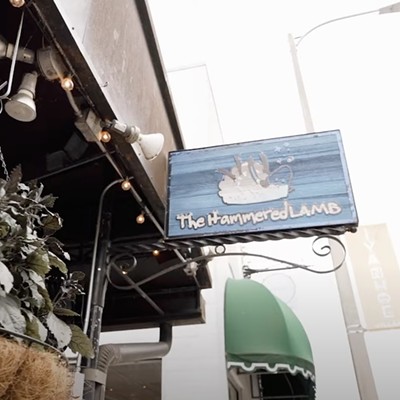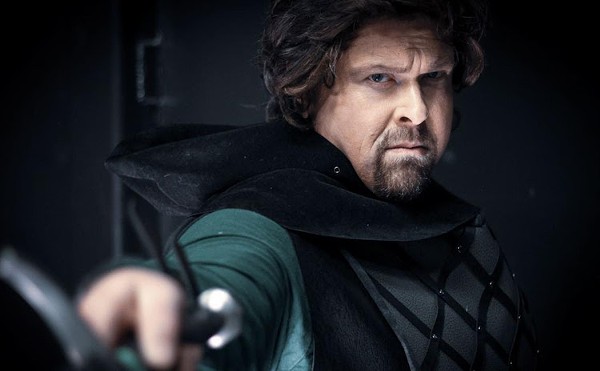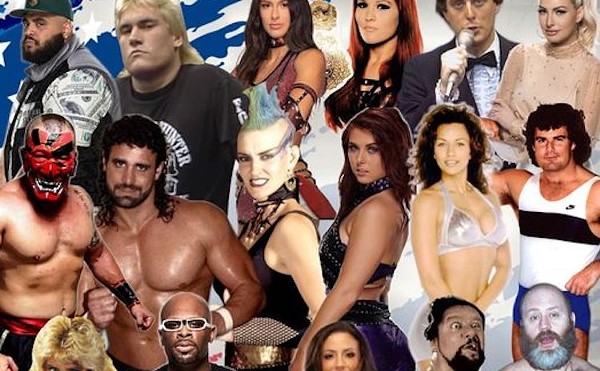Peg O'Keef was all smiles as she took the stage of the Enzian Theater to introduce the Monday-night installment of the Florida Film Festival. Not only was the event's executive director announcing her favorite portion of the program -- the documentaries -- but she was basking in the fulfillment of what she said was already shaping up to be "the best film festival ever."
Reel life is a funny thing. Maybe her words were some sort of cosmic jinx, for technical difficulties ground the proceedings to a halt almost as soon as she had finished speaking. The first few minutes of the short "Leche" ran without the benefit of audio accompaniment, its portrait of life in rural Mexico reduced to disconnected images of cows, chickens and mating grasshoppers as we all stared dumbly.
It wasn't the first of the festival's glitches, nor the funniest. The previous day, the soundtrack of the student-made short "Just Leave" had somehow been combined with that of another film, so that a quiet, dialogue-driven scene was underlaid with a bed of cartoonish shrieks and cackles. We all thought we were witnessing a new pinnacle in cutting-edge surrealism until a projectionist sheepishly apologized for the mix-up.
"Leche" was rewound and started again, revealing what we had all missed the first time: a few scattered sound effects of the cows chewing their cud and grain being shifted in a pan.
"Sound adds so much to this," some joker in front of me muttered, still confused by a narrative that was too sparse for already disoriented viewers to hone in on.
Fixing the mix
It was thankfully easier to follow "Come Unto Me: The Faces of Tyree Guyton," a biography of a Detroit artist who had turned his neighborhood's abandoned homes and vacant lots into a collage of found-object constructions and graffiti art. Guyton's noble attempt at community beautification resembled a more imaginative version of the Christmas decorations with which some ostentatious families festoon their lawns. You know the type: 16 reindeer, four Santas, two Virgin Marys, maybe even an Easter Bunny for good measure.
Despite the odd grace of Guyton's installations, he proved a less-than-riveting central figure, full of motivation but lacking in the wit or humor his hobby seemed to require. I wish some enterprising local director would lens a doc about Raymond Morris, the dumpster-diving visionary I had met a few weeks earlier at Artisans Guild of Orlando. His sardonic approach to mixed-media would play awfully well on the big screen, I'd wager.
Guyton was at least more likable than Greg Garing, the musical "Newcomer" profiled in Glenn Lazzaro's like-named short. An arrogant upstart of a country/bluegrass guitarist, Garing was heard spitting vitriol on the Nashville scene that had allegedly held him back, then seen relocating to New York to teach the clueless city folk a thing or two about real down-home passion. His clichéd story would only have been invigorating to an audience presold on the "Rolling Stone" philosophy that anything "rootsy" is automatically superior, or too out-of-touch to realize that country sounds are far from an unknown quantity in the Big Apple.
His master's voice
For genuine axe-mastering credibility, we had to wait for the 9:15 p.m. screening of "Hellhounds on My Trail: The Afterlife of Robert Johnson." But if we wanted to know more about the process that had brought the legendary bluesman's saga to celluloid, we would have to wait even further. Director Robert Mugge was stranded in an airport in Raleigh, N.C., and wouldn't make it to Orlando in time for the follow-up Q&A. He'd be in town later in the week, we were promised.
To make up for the loss, I grabbed a seat next to Cass Paley, the filmmaker behind the porno-documentary "WADD: The Life & Times of John C. Holmes." An outgoing, burly bear of a guy, Paley told me that his indoctrination into the rites of the adult film hadn't begun with his decision to retrace the career of its most infamous male lead. His cousin had been a production manager on some of Holmes' features, he said, adding that his own ex-girlfriend had been a porn actress as well. He even knew smut kingpins Al Goldstein and Ron Jeremy.
To my amusement, it turned out that the two of us had a friend in common: an old drinking buddy of mine who had gone to Hollywood a few years ago to break into the XXX industry and quickly succeeded in becoming one of its major players.
"She has one of the best websites around," Paley gushed. I was fairly sure that no one else in the room was having a similar conversation.
Laughing out loud
Paley apparently harbored as much of an affinity for good music as he did for Internet innovation. He chuckled delightedly at the reverent concert performances that made up most of "Hellhounds," singing along as a new generation of pickers put their own stamp on Johnson's small handful of immortal blues classics.
The film's historical segments wisely didn't attempt to re-enact the guitarist's life in the Mississippi Delta of the 1930s; Paley and I both agreed that substituting generic period footage for unavailable clips of the mysterious, rarely photographed Johnson would have been a calamitous mistake. Instead, we watched as a cadre of modern-day scholars sought to explain the icon's enduring influence and to separate the truths of his short existence from the myths that had sprung up in the 61 years since his death. Still, it was disconcerting that so much of the commentary came from white, middle-aged music experts and entertainment lawyers. A comparative dearth of interview time was granted to Johnson's few remaining contemporaries, whose insights into his considerable merits were far more illustrative. The lack of balance was a telling (if unintentional) exemplification of the struggle that's always faced black artists: Their pioneering endeavors net them little personal reward, leaving The Man in charge of their legacies. Oh, and their money.
With the film over, I decided to sandbag Paley with a question I had been dying to ask him for the past two hours.
"So," I inquired, "how does John Holmes compare to Robert Johnson?" I figured he might respond that both were giants in their fields, died before their time and were equal sources of endless controversy and speculation. Something like that.
Paley was having none of it. "John couldn't sing," he rapidly answered. "He couldn't play guitar, either."
Trumped again. At least he didn't make any jokes about the size of his Johnson.
Get an eyeful of Paley's work Tuesday at Enzian, where "WADD" receives its second festival showing at 9:45 p.m. Those who arrive early can partake of the 7 p.m. unspooling of "American Hollow," a slice of Americana that shifts the focus of the week's documentaries from the crossroads of Mississippi to the mountains of Appalachia.
















